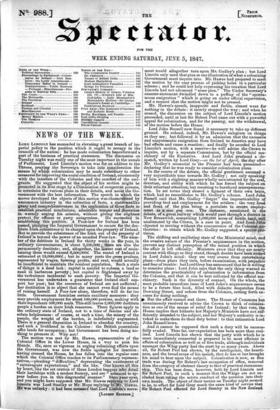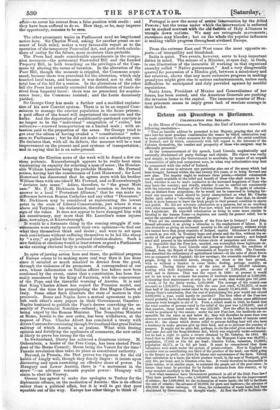NEWS OF THE WEEK.
LORD LINCOLN has succeeded in elevating a great branch of im- perial policy to the position which it ought to occupy in the councils of the nation : he has made colonization henceforward a part of the business of practical statesmen. The discussion on Tuesday night was really one of the most important in the annals of Parliament. Lord Lincoln's motion was for an address to the Throne' praying the Sovereign to take into consideration the means by which colonization may be made subsidiary to other measures for improving the social condition of Ireland, consistently with the interests of the Colonies and the comfort of the emi- grants. He suggested that the object of his motion might be promoted in its first stage by a Commission of competent persons, to scrutinize the various plans in their details, and assist the Go- vernment with the best information. The speech in which the mover developed the objects of this motion was characterized by uncommon industry in the collection of facts, a statesmanlike grasp and comprehensiveness in the application of those facts to establish practical conclusions, admirable temper and discretion in warmly urging his mission, without giving the slightest pretext for offence or party antagonism. He succeeded in -establisiiing this position. A Poor-law for Ireland has been passed, pledging the Imperial Government to secure for the des- titute Irish subsistence to be charged upon the property of Ireland. But to provide the subsistence of the Irish out of the property of Ireland is beyond the power of an unaided Poor-law. The num- ber of the destitute in Ireland for thirty weeks in the year, in ordinary circumstances, is about 2,500,000 ; there are also the permanently destitute ; and, altogether, the Itiviest cost of main- taining them would exceed 6,500,000/. The rental of Ireland is estimated at 13,000,0001.; but in many parts the gross produce, represented by wages, farming profits, and rent, would actually be insufficient to maintain the resident population. Such a state of things is a dead lock : capital is needed to redeem a land so sunk in barbarous poverty ; but capital is frightened away by the turbulence incidental to such poverty. '1 he Imperial Go- vernment has undertaken a guarantee that Ireland shall sup- port her poor; but the resources of Ireland are not sufficient ; her destitution is so abject that she cannot even find the means of raising herself. A Poor-law alone, therefore, will do far too little. Government furnishes certain auxiliary measures : they may provide employment for about 100,000 persons making with their dependents 500,000 souls. This still leaves 2,000,000 destitute people a burden on mere Irish resources. These figures apply to the ordinary state of Ireland, not to a time of famine and ab- solute helplessness : of course, at such a time, the misery of the people, the weight of the burden, is indefinitely augmented. There is a general disposition in Ireland to abandon the country, and seek a livelihood in the Colonies : the British possessions offer lands for occupation; • but Government has been doing no- thing to promote it. Why not? The motion was met by Mr. Hawes, representative of the Colonial Office in the Lower House, in a way to pain his friends. He, once so vigorous in urging colonizing efforts upon the Government, was now the feeble apologist for inaction : having crossed the House, he has fallen into the regular cant which the Colonial Office teaches to its Parliamentary represen- tatives,—pleading "difficulties," deprecating the excitement of "extravagant expectations," and the like. One knows all this by heart, like the set oration of those London beggars who detail their hardships with a modest fluency, and are ashamed to ap- pear before you in this disgraceful manner." Shut your eyes, and you might have supposed that Mr. Hawes replying. to Lord Lincoln was Lord Stanley or Mr. Hope replying to .Z4fr. Hawes. Helves unlucky : it had been assumed that Lord Lintoln's move-
ment would altogether turn upon Mr. Godley's plan ; but Lord Lincoln only used that plan as one illustration of what a colonizing Government must inquire into. Mr. Hawes had prepared to meet the motion by the easy process of picking holes in a particular scheme ; and he could not help expressing his vexation that Lord Lincoln had not advanced "some plan." The Under Secretary's counter-statement dwindled down to a puffing of the "sponta- neous emigration" which is going on under official supervision, and a request -that the motion might not be pressed.
Mr. Hawes's speech, inapposite and feeble, almost went for nothing in the debate : it merely stopped the way; and when he ceased, the discussion on the subject of Lord Lincoln's motion proceeded, until at last Sir Robert Peel came out with a powerful appeal for colonization, and for the passing, not the withdrawal, of the motion before the House. -
Lord John Russell now found it necessary to take up different ground. He echoed, indeed, Mr. Hawes's eulo,gium on things as they are ; but followed it by an admission that the excessive and unsystematic emigration from Ireland to America may have bad effects and cause a reaction ; and finally he acceded to Lord Lincoln's motion, with a reserve—he will advise the Crown to inquire, not by a separate Commission, but by the official ma- chinery of the Executive. And Lord John produced a de- spatch, written by Lord Grey—on the 1st of April, the day after Mr. Godley's memorial to the Premier had been presented— declaring that he was ready to consider colonization plans. In the course of the debate, the official gentlemen assumed a very unjustifiable tone towards Mr. Godley ; not only speaking of him with a slighting manner wholly unwarranted by the zeal, devotion, and ability with which he has forced the subject ott their reluctant attention, but resorting to barefaced misrepresenta- tion. In set terms they abused a figment of their own brain, which had no resemblance to Mr. Godley's scheme. Lord John Russell said that Mr. Godley "forgot" the impracticability of providing food and employment for the settlers : the very head and front of the plan being a postulate to secure employ- ment as a sine qua non. The instance, mentioned in the debate, of a great railway which would pass through a district in New Brunswick, comprising! 1,000,000 acres of fertile land, still unalienated by the Crown, is a case in point. And Lord: Jiihn objected to moving without the concurrence of the Colonial-Au- thorities : to obtain which Mr. Godley suggested a special pro- vision.
The shifting and oscillating state of the Ministerial mind, and the evasive nature of the Premier's acquiescence in the motion., prevent any distinct perception of' the actual position in which the affair is left officially. Ministers avow that they are nearly content with things as they stand, though doubts have been roiled in Lord John's mind : they are very averse from entertaining plans—from plans they turn, before examination, with prejudice and fear of trouble : but LordGrey has announced that he is willing to consider plans : Lord John says that the only. thing wanted to determine the practicability of colonization is Information from the Colonies, and that it can be best collected by the official ma- chinery. Such is the diversity of counsel. On the whole, the most probable immediate issue of Lord John's acquiescence seems to be a future blue book, filled with didactic despatches from Downing Street, and echoes from the Colonies, setting forth ex- cuses for doing nothing. • But the affair cannot rest there. The House of Commons has unanimously resolved to advise the Crown to think of coloniza- tion as one of the means of relief for Ireland : by that vote, the House implies that hitherto her Majesty's Ministers have not suf- ficiently attended to the subject, and her Majesty's authority is in- voked to make them do their duty better : to that intimation Lord John Russell bows.
And it cannot be supposed that such a duty will be success- fully evaded. Thus far, our expectation has been more than real- ized. Lord Lincoln has shown that the party with which he is most immediately connected is prepared to be most efficient in affairs of colonization as well as of free trade, although individuals amongst the Whig party had the start by so many years. Above all, Sir Robert Peel has shown, by the intelligence, the hearti- ness, and the broad scope of his speech, that he has at last brought his mind to bear upon the subject. Colonization is now, as free trade, was during Sir Robert's last occupation of office, removed from the category of abstract theory to that of practical statesman-
ship. This has been done, however, both by Lord Lincoln and Sir Robert Peel, in such a manner that the Whigs are not ex-
cluded from taking the active conduct of the question into their own bands. The object of their tactics on Tuesday night seemed to be, to effect for Lord Grey much the same kind of service that Sir Robert Peel effected for Lord Stanley in the New Zealand.
affair—to cover his retreat from a false position with credit : and they have been suffered to do so. How they, or he, may improve the opportunity, remains to be seen.

























